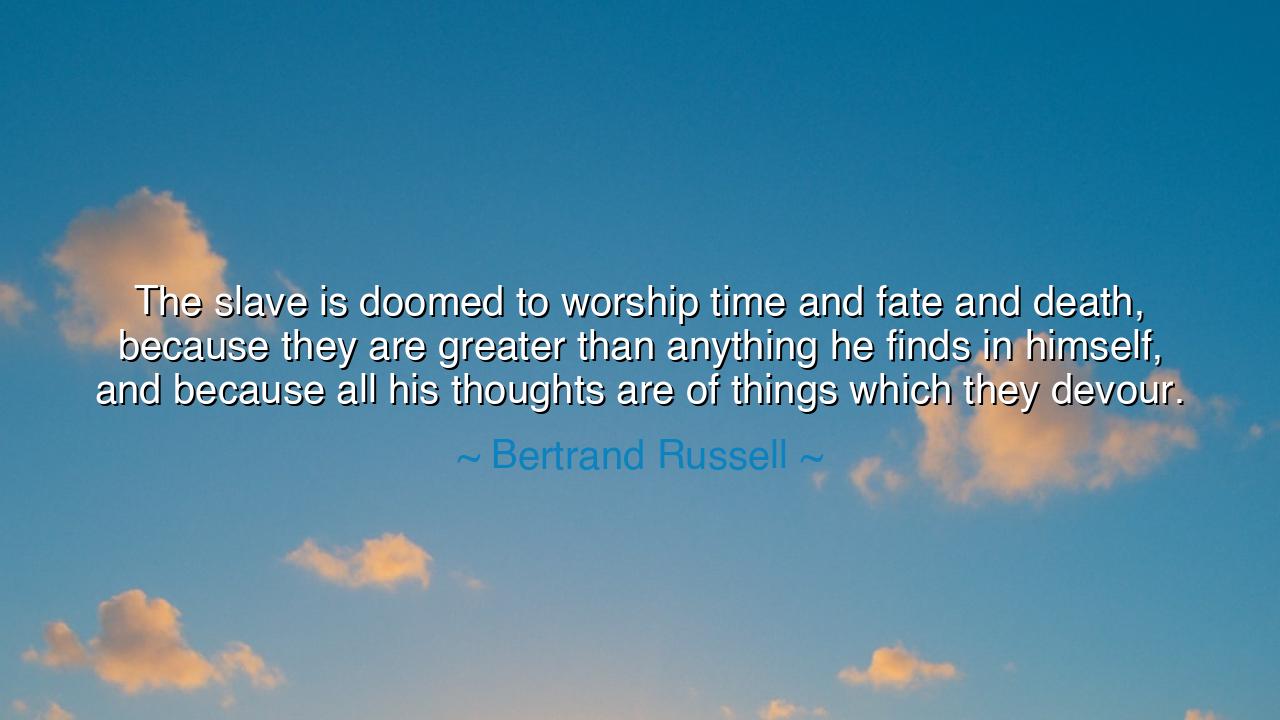
The slave is doomed to worship time and fate and death, because
The slave is doomed to worship time and fate and death, because they are greater than anything he finds in himself, and because all his thoughts are of things which they devour.






The words of Bertrand Russell—“The slave is doomed to worship time and fate and death, because they are greater than anything he finds in himself, and because all his thoughts are of things which they devour”—are carved from the stone of eternal wisdom. In these words lies a vision of the soul enchained, not merely by masters or empires, but by its own fear, submission, and smallness of spirit. The slave, as Russell speaks of him, is not only the one who labors under a whip; he is every person who has surrendered the sovereignty of their mind to forces beyond themselves. To worship time, fate, and death is to kneel before the inevitable, rather than to stand in defiance of it.
In ancient philosophy, to be free was not to be unchained in body, but to be unchained in soul. The slave, said the sages, is one who believes that life happens to him rather than through him. When a person sees only the passing of days and the cruelty of fortune, when he measures his worth by things that fade and rot, he becomes a prisoner to time. He fears death, for it will take all he clings to; he reveres fate, for it seems to hold the reins of his destiny. Thus, he bows to what he should challenge, forgetting that within him lies a spark greater than the stars themselves—the will to create meaning where none is given.
Behold the example of Epictetus, the philosopher-slave of Rome. Bound in chains and beaten by his master, he yet proclaimed that no man could enslave his mind. He taught that true freedom is mastery of the self, and that fate itself is powerless against the spirit that accepts and transforms it. Where the weak saw only loss and despair, Epictetus saw opportunity for strength. His thoughts were not of things which time devours, but of virtue, which time cannot touch. In this, he fulfilled Russell’s warning in reverse—he refused to worship time, fate, or death, for he found something greater within himself.
The tragedy of the spiritual slave is not his suffering but his surrender. He does not look inward for power; he looks outward, waiting for salvation or ruin. He builds his house upon the sands of circumstance and wonders why it falls with the tide. Every thought he holds is of possessions, pleasures, or fears—all destined for the grave. Thus, his gods become time, fate, and death, for these alone endure in the realm of things. Yet he could have chosen a different altar: that of courage, wisdom, and creation, where the soul stands eternal.
Russell’s words are a mirror to our age as much as to antiquity. Many today live not in chains of iron but in chains of anxiety and despair. They count the hours, fear misfortune, and mourn the years that slip away. They measure their worth by wealth, beauty, or fame—all of which time devours. Their faith is placed in destiny, their prayers whispered to the passing moment. In doing so, they forget that time is not their master but their canvas. To worship it is to waste it; to use it well is to transcend it.
There is a power in the human heart that no fate can break. The free soul does not deny death—it stares into its hollow eyes and still chooses to live nobly. It does not curse time for its brevity—it fills every hour with meaning, and so defeats the void. The free person sees fate not as a tyrant but as a companion in the great dance of existence. Thus, where the slave kneels before the inevitable, the free one walks beside it, shaping destiny through the strength of will and clarity of thought.
Lesson and Practice:
Do not worship what devours. Do not let your heart bow before time, fate, or death. Instead, lift your gaze inward, and find within yourself that which these powers cannot touch—the creative fire, the moral will, the capacity to love and endure. Each dawn, ask not what the day will bring, but what you will bring to the day. Seek not to escape fate, but to meet it with honor. Fill your thoughts not with what passes, but with what persists—truth, courage, and compassion. In doing so, you will cease to be a slave and become, as the ancients dreamed, a free soul walking among the gods.






AAdministratorAdministrator
Welcome, honored guests. Please leave a comment, we will respond soon